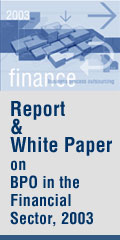|


|
Proposed Basel II amendments to impact structured finance, say Fitch
February 19, 2009:
Fitch Ratings says that new proposals for updating the Basel II framework would impact structured finance globally and the asset-backed commercial paper (ABCP) market in particular.
The proposals, published last month by the Bank for International Settlements (BIS), seek to update the Basel II framework in response to market events of the past 18 months which have triggered global financial turmoil.
"Originally Basel II was intended to promote a level playing field by providing neither an incentive nor a disincentive for a bank to securitize assets. However, under the latest proposals for re-securitisation exposures there would be a clear disincentive for banks to provide liquidity facilities to ABCP conduits," says Peter Winning, a Director in Fitch's European Structured Finance team.
The proposals would make several changes to how banks calculate their minimum capital requirements. Firstly, banks using the internal ratings-based (IRB) approach or the standardised approach would have to apply higher risk weights to any re-securitisation exposure. (A re-securitisation exposure is defined as a securitisation exposure where the underlying assets themselves may include securitisations.) The proposals explicitly list liquidity facilities supporting ABCP conduits as an example. This would mean that such a liquidity facility with an internal or external rating would be subject to a higher risk weighting than a comparable 'regular' securitisation exposure. It is worth noting that this proposal would also impact the risk weighting on certain types of CDO (such as CDOs of asset-backed securities (ABS)).
Another proposal regards the use of ratings based on a guarantee a bank has provided (so called 'self-guarantee' exposures). Under the proposal, a bank would not be able to recognise a rating on an exposure where the rating is largely dependent on a guarantee provided by the same bank. The proposal gives an example where a bank is providing a liquidity facility and/or any credit enhancement to an ABCP exposure. The proposal is intended to prevent capital arbitrage on 'back-door' liquidity support, whereby a bank buys the ABCP from a conduit it sponsors, rather than drawing down on the liquidity facility it provides. As the ABCP is rated, the bank has been able to enjoy a lower capital charge than it would have had if it had drawn down on the liquidity facility.
Under the proposal, this arbitrage will be eliminated, although banks will be able to offset the capital charge on the liquidity facility against the capital charge on any ABCP it buys (so a bank is not charged twice for the same exposure). In Fitch's opinion this is likely to reduce the incentive for banks to support their conduits by buying ABCP. However, another motive for buying ABCP was to then use the ABCP as collateral in repurchase agreements (repos) with central banks. Consequently, this activity may persist in Europe as banks look to exploit this source of funding. In the US, the Federal Reserve now has various mechanisms for buying ABCP directly from issuers, via certain dealers, which probably eliminates the need to use ABCP as collateral in repo transactions with central banks.
>>> GO TO NEXT PAGE
Enhancements to the Basel II capital framework... Read here
Credit Implications of U.S. Financial Stability Plan & Stimulus Act
Principles for sound stress testing practices and supervision
External audit quality of banks need to improve, says Basel Committee
Basel Consultative paper for assessing fair valuation practices
Basel Committee announces strategy to address lessons of banking crisis
IMF Welcomes Comprehensive European Response to Financial Crisis
IMF sees heightened risks to global financial stability
CLICK FOR SPECIAL SECTION ON GLOBAL FINANCIAL CRISIS
Subprime Crisis: A Special
CLICK FOR MORE FEATURES & STORIES
|
|
|